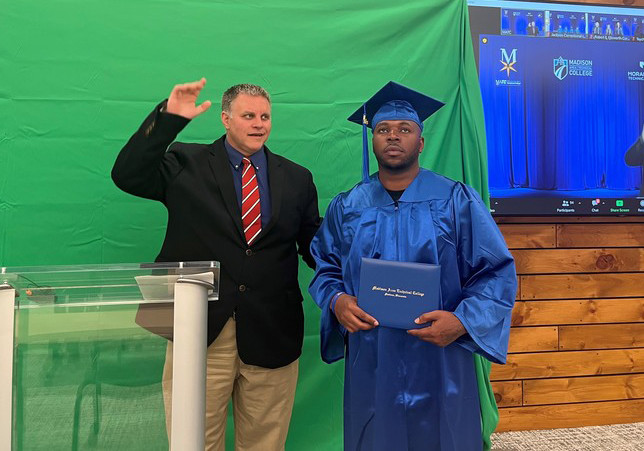Inmates Receive College Degrees Through Second Chance Program
49 individuals earned certificates or degrees this week from three technical colleges.

Jimmy Cunningham, 40, was one of 49 inmates to receive his diploma Tuesday through the federal Second Chance program. Cunningham, who was recently released from prison, earned a certificate in small business administration from Madison Area Techincal College. Corrinne Hess/WPR
Hope is hard to come by in prison.
But on Tuesday, 49 people incarcerated in Wisconsin’s correctional institutions found a reason to believe brighter days are ahead.
The inmates are the latest group to earn certificates or associate degrees through Second Chance programs at Milwaukee Area Technical College, Madison Area Technical College or Moraine Park Technical College.
Delante Higgenbottom was 36 years old when he was sentenced to 17 years in prison for armed robbery. A decade later, Higgenbottom is living at Fox Lake Correctional Institution, now holding an Associate of Arts degree from Madison Area Technical College.
“In my mind, my life was over. I was thinking, ‘Who’s going to hire a Black, 53-year-old, ex-con felon with an employment gap of 17 years?” Higgenbottom said moments before receiving his diploma.
“But then I heard about the Second Chance program, and it gave me hope. I started to think like, maybe that would make me a little more important. And that’s what this is about, giving that little glimmer of hope to someone who might have otherwise given up.”
The Second Chance Pell Experiment was first established in 2015 by the Barack Obama administration to provide Pell Grants to incarcerated individuals to allow them to participate in post-secondary education programs.
The program initially covered 67 programs. An additional 67 were added in 2020.
To date, students have earned more than 7,000 certificates and degrees. The Second Chance program was set to expire on July 1, but has been expanded by the Biden administration to include 73 colleges and universities, bringing the total number of participating schools to 200.
In Wisconsin, Milwaukee joined the program in 2016. Madison joined in 2020, and Moraine Park Technical College joined last year.
If there is a waiting list for a certain program, preference is given to inmates who only have five to seven years left on their sentence, said Ben Jones, education director with the state Department of Corrections. Otherwise, any inmate eligible for a Pell Grant can apply.
Programs include small business administration, welding and arts.
Because federal dollars pay for the program, Second Chance is not without controversy.
“You can have a legitimate debate about spending money to put people in a lower socioeconomic class through college,” Jones said. “But if people want to go to college to better their lives, does it matter if they are sitting on this side or that side of the fence? Over 94 percent of people (who are incarcerated) are going to come back to the communities. The broader question people have to answer is how do we want them to spend their time?”
Dr. Sadique Isahaku administers the correctional education program at Milwaukee Area Technical College. There are about 200 students in the program and another 200 inmates have graduated since 2016.
“I’m very impressed about their achievement, their resilience and persistence to complete their programs,” Isahaku said. “They’re scoring very high GPAs. Their GPAs are higher than our traditional student GPAs.
Inmate GPAs at MATC were 3.0 or higher, Isahaku said. He attributed that to those students having more time to study. Inmates also have different challenges than students living in Milwaukee, including transportation issues, housing and food insecurity and jugging school, work and family responsibilities, Isahaku said.
Jimmy Cunningham, 40, got out of Jackson Correctional Institution in October 2022 after serving eight years for armed robbery. While incarcerated, Cunningham got his high school diploma. On Tuesday, he received a certificate in small business administration from Madison Area Technical College.
He’s enrolled in MATC in the fall so he can continue on to an associate’s degree.
Cunningham has been in and out of jail since he was a teenager. Patting the blue book, holding his new diploma, he says he’s not going back.
“Eight years just got taken out of my life for a mistake that could have been avoided,” Cunningham said. “This was a setback, but I can change. This is going to keep me on the right path. I’m not going to let myself down, or anyone else who do believe in me.”
Listen to the WPR report here.
‘It gave me hope’: Wisconsin inmates receive college diplomas through Second Chance program was originally published by Wisconsin Public Radio.





















